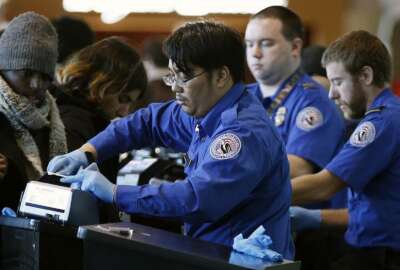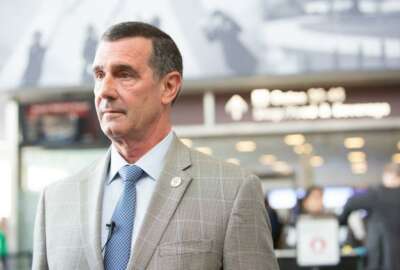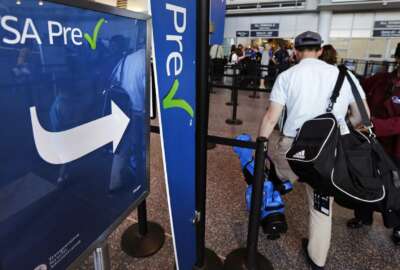House advances bill to boost pay, benefits for TSA employees
The bill would bring 60,000 TSA employees, including transportation security officers, under the same personnel system as other federal employees under Title 5 of...
A perennial effort to increase pay and benefits for Transportation Security Administration employees took a major step forward this week after the House passed the Rights for the TSA Workforce Act of 2022 on Thursday.
The bill would bring 60,000 TSA employees, including transportation security officers, under the same personnel system as other federal employees under Title 5 of U.S. Code. That includes full collective bargaining rights, access to an independent third party for dispute resolutions and the General Schedule pay system.
Homeland Security Committee Chairman Bennie Thompson (D-Miss.), one of the leading sponsors of the bill, called it “the right thing to do” in a statement released after the bill passed the House. The bill would eliminate the special personnel authorities that have governed workplace conditions for TSA employees since the agency’s inception two decades ago.
“It’s long past time that we place this critical workforce under Title 5 to provide better pay and full collective bargaining rights,” Thompson said. “Doing so will reduce attrition, boost morale and improve and professionalize the TSA workforce.”
The House passed the bill 220-201, almost entirely along party lines, with four Republicans joining Democrats in voting for the measure.
Homeland Security Committee Ranking Member John Katko (R-N.Y.) declined to support the bill. He said he supports increasing pay and benefits for frontline TSO’s, but not for the rest of the TSA workforce.
“If the bill was limited to just them, I would support it,” Katko said on the House floor. “Why do we have to make it for everyone else?”
Katko said he thinks the bill will be “dead on arrival” in the Senate. Republicans also objected to giving TSA employees full collective bargaining.
But Katko said he will support increased appropriations for TSA to raise the salaries of the frontline screening workforce. The Biden administration has proposed a fiscal year 2023 budget for TSA that would finance the agency’s pay equity plan, including a 30% average increase in base pay for TSO’s.
Meanwhile, the American Federation of Government Employees applauded the House passing the bill, and called on the Senate to quickly pick up the legislation.
“TSA officers have been treated as second-class citizens for far too long,” AFGE President Everett Kelley said in a statement. “Despite the unfair pay and treatment, they continue show up for their country each and every day. They have worked for no pay during government shutdowns and put their health at risk throughout the pandemic to ensure the traveling public is safe.”
In the Senate, similar legislation was introduced last year by Sen. Brian Schatz (D-Hawaii) and Sen. Edward Markey (D-Mass.). It was referred to the Committee on Commerce, Science and Transportation, which has yet to take further action on the bill.
‘Many positive effects’
The Biden administration has backed the legislation, and in a Jan. 19 letter to Thompson, TSA Administrator David Pekoske laid out the agency’s analysis of the bill.
“Our analysis indicates we will see many positive effects from this important legislation; the ability to achieve pay equity for our Transportation Security Officers (TSOs) chief among them,” Pekoske wrote.
Specifically, the entire TSO workforce would see an average 30% pay increase if the bill was fully enacted, according to the document. The average annual salary for transportation security screeners nationwide was $44,920 in May 2020, according to the latest available data from the Bureau of Labor Statistics, although wages vary across geographic regions.
According to Pekoske’s letter, 75% of TSA employees are paid less than the minimum pay that a federal employee with equivalent experience would receive under the General Schedule wage system.
“Limited pay progression, due to budget constraints in recent years, has resulted in
inequitable compensation for our workforce compared to our federal counterparts,” Pekoske wrote. “It also has made recruiting increasingly difficult and resulted in relatively high attrition rates, particularly for TSOs.”
Meanwhile, TSA’s law enforcement workforce would see an average 21% pay increase if the legislation is fully enacted and funded, according to the agency’s analysis.
Ensuring equitable pay for its employees is a “critical step in positioning TSA for long-term success,” Pekoske wrote.
“Over time, these steps may reduce the high levels of attrition in the TSO workforce as well,” he wrote.
GAO reviews and air marshal assistance
The House-passed bill would also direct the Government Accountability Office to review implementation of the new personnel processes within 60 days of TSA employees being converted to Title 5.
Additionally, it would direct GAO to review TSA’s efforts to recruit veterans, members of the armed forces, and their dependents, including recommendations on how to improve those processes.
It would also encourage the TSA administrator to work with organizations that represent federal air marshals to address mental health, suicide rates, and morale and recruitment issues. TSA oversees the Federal Air Marshal Service.
“Data from the Air Marshal Association show that air marshals are at high risk for extreme fatigue due to the long hours they spend on planes and their irregular sleep schedules,” Rep. Jennifer Wexton (D-Va.) said on the House floor. “Many marshals also report mental health issues and a reliance on medications and alcohol to fall asleep.”
The bill would also direct a one-time $3,000 bonus payment for hazard duty to TSA employees who had substantial contact with the public during the pandemic. It would additionally direct the TSA to work with Centers for Disease Control and Prevention and the National Institute of Allergy and Infectious Diseases to ensure employees have proper protection from COVID-19 going forward.
Top priority
The legislation would codify into law efforts already underway by the Biden administration to raise pay and benefits for TSA employees. Biden also recently re-nominated Pekoske to serve another five-year term as TSA administrator. Pekoske has called supporting the workforce his “top priority.”
Last June, Homeland Security Secretary Alejandro Mayorkas directed TSA to expand collective bargaining rights for TSO’s, negotiate an agreement to bring appeals before the Merits Systems Protection Board, and develop a plan to pay screeners in line with the General Schedule.
In September, TSA and the MSPB reached an agreement that allows TSOs to appeal some firings, demotions and long-term suspensions before the board.
Meanwhile, AFGE has called on TSA to expand collective bargaining for TSOs immediately. But TSA told the union it needs additional funding to hire staff that can support an expanded labor framework.
Copyright © 2025 Federal News Network. All rights reserved. This website is not intended for users located within the European Economic Area.
Follow @jdoubledayWFED






